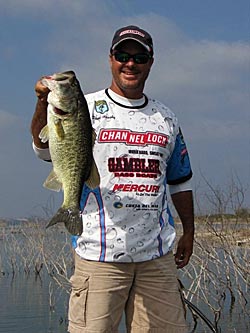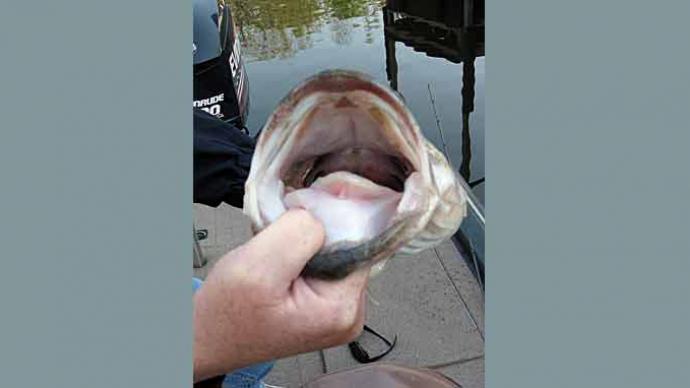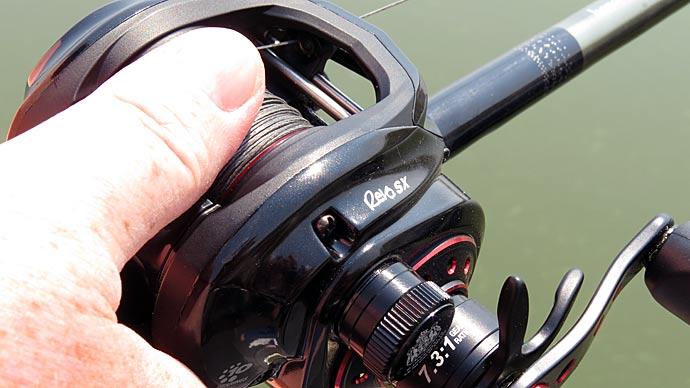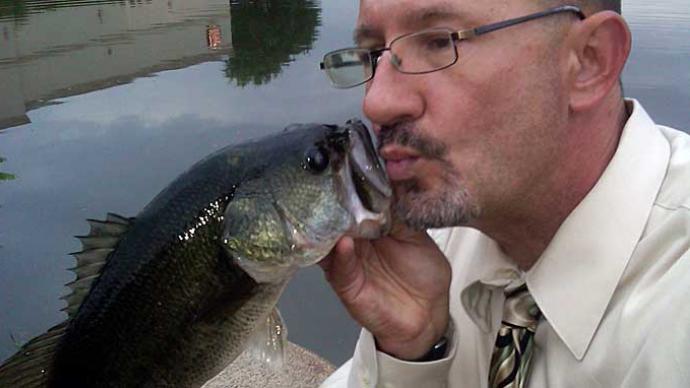
Is there anything worse than being in a tournament, throwing a swimbait, and having countless bass come up and nudging the bottom of it? What about a bass who warily follows your swimbait back to the boat only to pounce on it just as your bait comes out of the water?
The reward for your efforts when throwing a swimbait for a day could be fantastic. Taking the chance to throw a swimbait on your home body of water for a day can be very rewarding, but only if you're committed to catching the biggest bass in the lake. Then again, your chances may increase slightly if your home waters contain large trout or other large baitfish, requiring even bigger swimbaits to imitate them.
According to three-time Bassmaster winner and Bassmaster Elite Series competitor James Niggemeyer, when it comes to swimbaits, he has this to say about why they work so well. "It has a tremendous visual appeal to bass and can draw fish from long distances to strike because of its natural look and action. Swimbaits work so well when catching big bass because they work well in deeper water on structure when used with a lead head like a Strike King Squadron Swimbait Heads jig head. I have done well with it, and it's become popular lately on an umbrella rig. I use a keeper called a Change-up or a weighted hook when I need it to be more weedless."
Former Bassmaster Elite Series competitor and Bassmaster Open champion Paul Hirosky thinks the swimbait is beautiful in many ways. "Here comes the beauty of the swimbait. Fewer but bigger bites, the 'money' bites. No wasting time catching, culling, or re-rigging with smaller fish. Swimbaits let you cover water quickly at different depths while appealing to the biggest fish in the area."
What Conditions?
Niggemeyer and Hirosky discussed what parts of the country and what conditions swimbaits work best in.
Both anglers agreed that they would work in clear to moderately stained water. "The Shadalicious is very versatile for a lot of applications, though it is best in clear to moderately stained water," Niggemeyer said. He also says swimbaits are good in all stages of the spawn.
In many of the waters around Hirosky's home in Pennsylvania, he has also found some of the same success that he had with swimbaits back in the western states, even though Pennsylvania does not have the numbers or the size of Trophy bass that the western states he visited do.
"After exposure to swimbaits in California at a few Elite Series stops, I couldn't wait to get home to PA and try them. Within days of getting home, I caught them here with the same baits as out in Cali. So they have applications everywhere when you need a big bite."
Why Are They Better?
Swimbaits have an advantage over some of the more traditional baits. "I think it helped boost the weights in some of the tournaments and made more guys big fish hunters instead of numbers catchers," Hirosky said.
How a swimbait looks and moves is a significant and essential factor. "It has great action, realistic look, a wide variety of colors, and is made of a nice plastic material for which this bait is designed," Niggemeyer said, referring to the Strike king Shadalicious.
Swimbaits are another essential tool when it comes to having the power to draw bass out of crystal-clear water. "It's one of the best baitfish imitators in clear water and when fish are keyed on bait," Niggemeyer said.
The Right Combination
It takes the right equipment to use and effectively get the most out of swimbaits. You need equipment that can handle the size of the swimbait you're throwing but can also handle the cover in which you're fishing.
Hirosky does not use just one combination when it comes to throwing swimbaits. "I use many combos based on size and conditions, but I will give you the most common. I use a seven-foot-six-inch Medium-Heavy Denali Lithium rod with a Chronarch reel and fifteen-pound Seaguar Fluorocarbon line."
There is not just one set-up that is correct for fishing swimbaits. Instead, there are several that are on the market that has different actions and purposes when it comes to swimbait fishing. "I use a seven-foot St. Croix Legend Tournament Medium rod, Ardent Apex Elite reel (6:5 to1 gear ratio), and anywhere between twelve and twenty-pound Gamma Fluorocarbon line depending on the size and cover I am fishing around," says Niggemeyer.
Successes and Memories
When it comes to where Hirosky has had his most successes and the best luck with swimbaits, it all goes back to the 2007 Bassmaster Elite Series event on Clear Lake. "I still think it goes back to the second day of the Elites Series event on Clear Lake when I stopped resisting and, halfway through the day, started throwing that thing around and committed to it. That was like the 'first kiss' moment I'll never forget."
Niggemeyer still remembers his biggest limit on a swimbait very well. "Usually, they play a role or have somehow complimented my bag. However, if I recall correctly, I caught a twenty-one or twenty-two-pound bag in a BASS Elite event on day two in Guntersville, all on swimbaits. The biggest was around six pounds."
Which Swimbait?
Since swimbaits showed their power on Clear Lake back when the Elite Series visited there in 2007, hundreds, if not thousands, of swimbaits have appeared on the market, when deciding what type of swimbait to throw and choosing between hard swimbaits, soft swimbaits, or hollow-belly swimbaits, it can be a tough choice.
"I don't like hard swimbaits. I don't know why, but I don't. As far as hollow-belly versus other soft swimbaits, it's just a matter of conditions, what I am trying to accomplish, and where I am fishing, geographically, and on a given body of water. My favorite is the Basstrix," Hirosky says.
James Niggemeyer favors the Strike king Shadalicious as his swimbait of choice. Three-and-a-half and four-and-a-half inches are my favorite sizes, though I have caught fish of all sizes. The Shadalicious is my favorite swim bait. I like the head and tail shake or wobble as it's reeled through the water. My favorite colors are Green Gizzard and Blue Gizzard," Niggemeyer says.
When choosing which size swimbait to throw on any given day, it's best to base it on the size of the bass you want to catch. "Size, to me, is a function of the size of fish you want to catch. Every step up in size increases the odds of bigger bites but eliminates a percentage of smaller bites. But, of course, that's not saying small baits don't catch giant bass sometimes," said Hirosky.
When choosing which color swimbait to throw once you get out on the lake, the conditions should dictate your choice. "Color is a function of water clarity, forage, or effect. An example is using the Mattlures Bluegill for spawning bass. Swim it through the bed or sit there, which is awesome. I am mostly trying to replicate the local shad on the lake," Hirosky said.
When it comes to choosing what weight swimbait you should use, it depends on the depth and how much action you want the bait to have. "I like to use the lightest amount possible to give the lure the most mobility and action. Something like a 1/8, 3/32, 1/4 to 3/8th ounce being the heaviest. Typically I use heavier for deeper depths and structure," says Niggemeyer.
Where?
When you find what type of cover the bass are holding to on a particular day you are fishing swimbaits, it's possible to catch some giant bass. Hirosky's biggest five-bass limit caught in a tournament on a swimbait weighed an impressive twenty-five pounds.
"I fish swimbaits just about anywhere and everywhere. Above grass, around wood, scattered pads, open water, docks, and even for smallmouth. Generally, I fish them in less than twelve feet of water but have caught schoolers over open water in forty-plus feet. They are great from pre-spawn right through the fall. After that, it is easier to say when not to try them. My least success seems to be during post-frontal conditions and in muddy water," says Hirosky.
If you can put all the puzzle pieces together and find the right combination, swimbaits can be deadly. "In the spring, you can fish it for pre-spawn fish to post-spawn for fry-guarding fish. Works well around the shad spawn and bluegill beds also. Fall... it's great for fish that have made the fall migration to the backs of creeks and are chasing shad," says Niggemeyer.
Something Different
Anglers are tinkerers by nature, and Paul Hirosky is just that. After he started fishing Hollow-belly swimbaits, he made a few modifications. "I like to cut a slit in the head and put a lead tube head in it, 3/8 or ½ ounce, and glue it back closed. It casts a mile, and I use it for schoolers or to work down steep banks and bluffs. I like to add little thin glass rattles inserted into the plastic. Especially if the water is a little more stained, I will attach a thin plastic tube (like you get with a can of WD-40) to a can of aerosolized fish-scent like Bang shad-scent and spray it into the back of a hollow swimbait. The scent stays longer and trickles out."
Conclusion
Swimbaits are here to stay, but it takes a strong will by the fisherman to use them to exclude the smaller bite. Again, I thank James Niggemeyer and Paul Hirosky for providing valuable information.
BassResource may receive a portion of revenues if you make a purchase using a link above.




